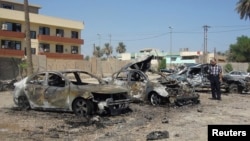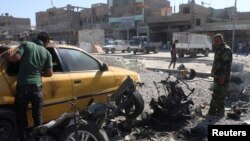CAIRO, EGYPT —
Dozens of people were killed or wounded Monday in the Iraqi capital, Baghdad, when multiple car bombs exploded in mostly Shi'ite districts during morning rush hour.
Fire crews doused the burning wreckage of a car bomb in Baghdad's mostly Shi'ite district of Sadr City Monday morning. The explosives-laden vehicle blew up near a corner where day laborers wait for potential employers. Over half a dozen workers were killed in the blast.
Video footage showed several burnt-out vehicles, twisted metal wreckage and rubble from nearby shops ripped open by the explosion. An eyewitness said the driver of the car bomb left the vehicle before it blew up. He said a white Avio vehicle was parked nearby, not far from the workers, before it exploded suddenly, breaking up into several parts.
Workers swept concrete chunks of rubble and broken glass from the street as passers-by milled around to see what happened. Casualties were taken to nearby hospitals.
Reuters news agency reported that 14 car bombs went off across the Iraqi capital within a short period of time, in what appeared to be a coordinated spate of attacks. Most of the blasts appeared to target Shi'ite sectors of the capital.
Interior Ministry spokesman Sa'ad Ma'an told Iraqi TV that car bombs went off in the districts of Kazemiyah, Sha'ala, Hye al Jamiah, Ghazaliya and Square 55. Iraqi security forces also closed the 14th of Ramadan Bridge to prevent terrorists from moving about freely.
Iraqi Foreign Minister Hoshyar Zebari blamed al-Qaida for the blasts in an interview with The Associated Press. He also claimed that recent violence in Iraq was “not a sign of sectarian conflict.” He argued that Iraqis had “learned from [previous] sectarian violence.”
Despite Zebari's assessment, Hilal Khashan, who teaches political science at the American University of Beirut, said participation of Iraqi Shi'ite militiamen in the fighting in neighboring Syria has directly exacerbated the sectarian violence in Iraq.
"I think the explosions in Iraq, especially attacks against Iraqi Shi'ites, have much to do with the involvement of the Shi'ite Abou Fadel al Abbas battalion in the Syrian armed conflict. There are thousands of Iraqi Shi'ites fighting in Syria,” said Khashan.
Khashan said Lebanon's Shi'ite Hezbollah militia also has been actively training Iraqi militiamen to fight inside Syria on the side of the Assad government. He said that has led to the resentment of Sunni populations in both Iraq and Lebanon, and to recent acts of violence in both countries.
Fire crews doused the burning wreckage of a car bomb in Baghdad's mostly Shi'ite district of Sadr City Monday morning. The explosives-laden vehicle blew up near a corner where day laborers wait for potential employers. Over half a dozen workers were killed in the blast.
Video footage showed several burnt-out vehicles, twisted metal wreckage and rubble from nearby shops ripped open by the explosion. An eyewitness said the driver of the car bomb left the vehicle before it blew up. He said a white Avio vehicle was parked nearby, not far from the workers, before it exploded suddenly, breaking up into several parts.
Workers swept concrete chunks of rubble and broken glass from the street as passers-by milled around to see what happened. Casualties were taken to nearby hospitals.
Reuters news agency reported that 14 car bombs went off across the Iraqi capital within a short period of time, in what appeared to be a coordinated spate of attacks. Most of the blasts appeared to target Shi'ite sectors of the capital.
Interior Ministry spokesman Sa'ad Ma'an told Iraqi TV that car bombs went off in the districts of Kazemiyah, Sha'ala, Hye al Jamiah, Ghazaliya and Square 55. Iraqi security forces also closed the 14th of Ramadan Bridge to prevent terrorists from moving about freely.
Iraqi Foreign Minister Hoshyar Zebari blamed al-Qaida for the blasts in an interview with The Associated Press. He also claimed that recent violence in Iraq was “not a sign of sectarian conflict.” He argued that Iraqis had “learned from [previous] sectarian violence.”
Despite Zebari's assessment, Hilal Khashan, who teaches political science at the American University of Beirut, said participation of Iraqi Shi'ite militiamen in the fighting in neighboring Syria has directly exacerbated the sectarian violence in Iraq.
"I think the explosions in Iraq, especially attacks against Iraqi Shi'ites, have much to do with the involvement of the Shi'ite Abou Fadel al Abbas battalion in the Syrian armed conflict. There are thousands of Iraqi Shi'ites fighting in Syria,” said Khashan.
Khashan said Lebanon's Shi'ite Hezbollah militia also has been actively training Iraqi militiamen to fight inside Syria on the side of the Assad government. He said that has led to the resentment of Sunni populations in both Iraq and Lebanon, and to recent acts of violence in both countries.







